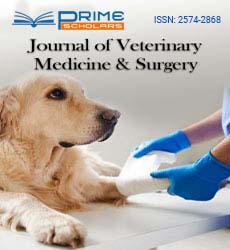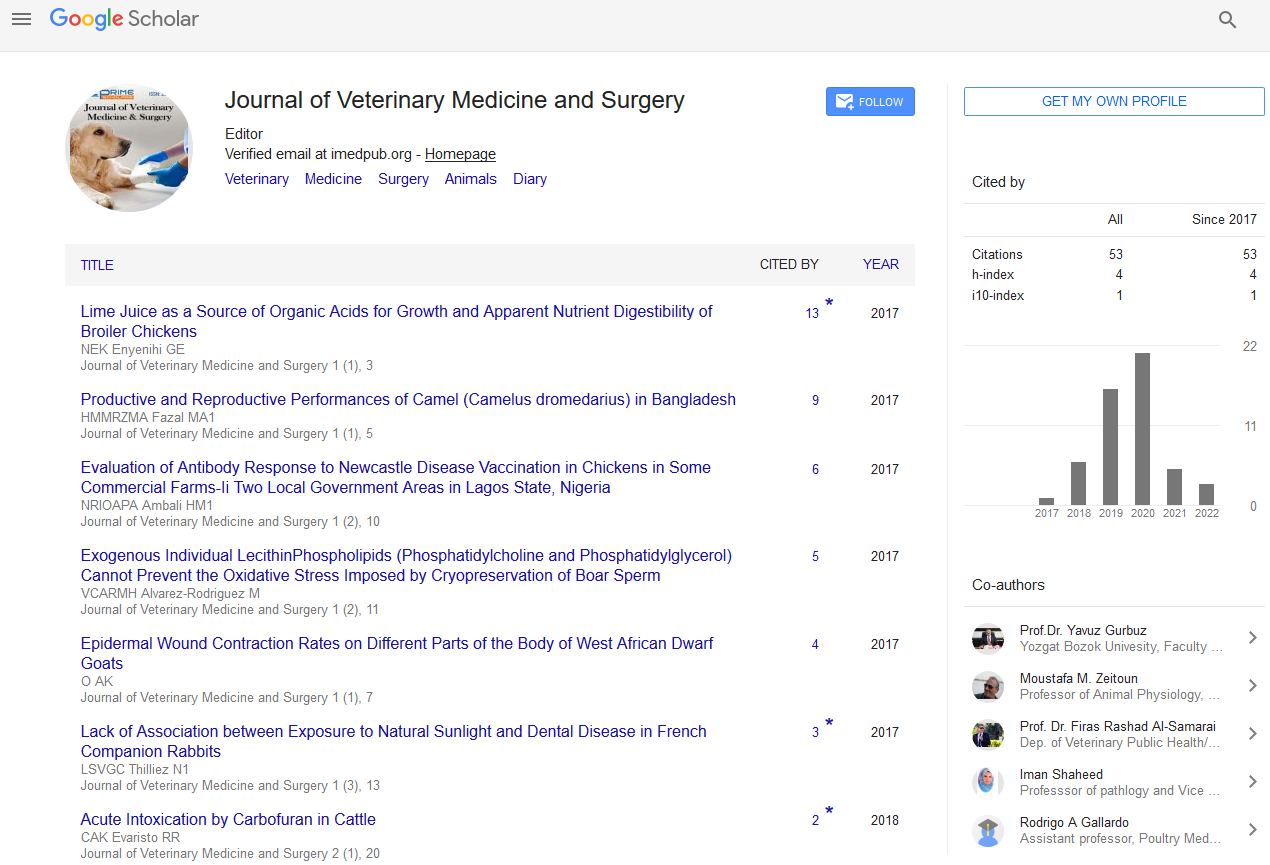Commentary - (2024) Volume 8, Issue 4
Veterinary Pharmacology: The Science of Medicines for Animals
Christopher Lopez*
Department of Pharmacology, University of Waterloo, Canada
*Correspondence:
Christopher Lopez,
Department of Pharmacology, University of Waterloo,
Canada,
Email:
Received: 02-Dec-2024, Manuscript No. IPJVMS-24-22175;
Editor assigned: 04-Dec-2024, Pre QC No. IPJVMS-24-22175(PQ);
Reviewed: 18-Dec-2024, QC No. IPJVMS-24-22175;
Revised: 23-Dec-2024, Manuscript No. IPJVMS-24-22175(R);
Published:
30-Dec-2024, DOI: 10.36648/2574-2868.8.4.38
Description
Veterinary pharmacology is a specialized field within veterinary
medicine that focuses on the study of drugs and their effects
on animals. It involves understanding how medications are
absorbed, distributed, metabolized, and excreted by animals,
as well as how they interact with biological systems to treat
or prevent diseases. The field plays a critical role in ensuring
the safe and effective use of pharmaceuticals in animals,
ranging from pets to livestock and wildlife. The primary aim
of veterinary pharmacology is to ensure that drugs used to
treat animals are safe, effective, and tailored to the unique
physiological needs of different species. Animals, like humans,
can suffer from a wide range of illnesses, including infections,
chronic conditions, and injuries, which require appropriate
pharmaceutical interventions. Veterinary pharmacologists
work alongside veterinarians to provide guidance on the use of
drugs in veterinary care, helping to choose the right medication
and dosing regimen based on the animalâ??s age, weight, species,
and health status. Veterinary pharmacology also includes
the study of drug interactions, potential side effects, and
contraindications. By understanding how different drugs work
together or interact with other treatments, pharmacologists
can minimize risks and ensure optimal therapeutic outcomes.
Additionally, this field is key to the development of new drugs
and therapies for animals, as the unique physiology of different
species may require specialized treatments. Veterinary
pharmacology has seen significant advancements in recent
years, particularly with the development of more targeted
therapies and improved drug delivery systems. One of the most
promising areas of progress is the development of biologics,
including monoclonal antibodies and vaccines, to treat or
prevent various diseases in animals. These therapies allow for
more specific treatments with fewer side effects compared to
traditional drugs. Additionally, advances in pharmacogenetics,
the study of how genetic differences affect drug responses,
are beginning to influence veterinary pharmacology. This
approach allows for the customization of drug regimens based
on an animalâ??s genetic makeup, improving the precision and
effectiveness of treatments. Despite the advancements, there
are several challenges in veterinary pharmacology. One of
the main issues is the lack of research and data on the safety
and efficacy of drugs in different animal species. While many
drugs are approved for use in humans, they may not always
be suitable for animals, and the absence of species-specific
information can lead to inappropriate use of medications. This
is particularly true for exotic and wildlife species, for which
there is limited pharmacological data. Another challenge is
the increasing concern over the use of pharmaceuticals in
food-producing animals. The use of antibiotics and other drugs
in livestock has raised concerns about food safety and the
potential for drug residues in meat, milk, and eggs. Veterinary
pharmacologists are working to develop alternative treatments
and better monitoring systems to address these concerns.
Veterinary pharmacology plays a vital role in the effective
treatment and management of animal health. Through the
study and application of drugs, pharmacologists help ensure
that animals receive the right medications for their conditions,
ultimately improving their quality of life. As the field continues
to evolve, new advancements in drug development, delivery
systems, and personalized treatments will contribute to
better healthcare outcomes for animals. With the continued
focus on safety, efficacy, and responsible drug use, veterinary
pharmacology remains an essential part of modern veterinary
medicine.
Acknowledgement
None.
Conflict Of Interest
None.
Citation: Lopez C (2024) Veterinary Pharmacology: The Science of Medicines for Animals. J Veterinary Med. 8:38.
Copyright: © 2024 Lopez C. This is an open-access article distributed under the terms of the Creative Commons Attribution Li-
cense, which permits unrestricted use, distribution and reproduction in any medium, provided the original author and source
are credited.

